Archbishop Makarios barely had any opposition when he stood for president – three times – and there was no second round until 1988
A record 14 candidates will be contesting today’s presidential elections, and this is after two pulled out before the official submission of the candidacies in January.
But it was not until 1983 that more than two candidates had stood in a presidential election, and even then it was decided in the first round. Spyros Kyprianou, with the backing of Diko and Akel as well as from the thousands he gave jobs to in the expanded public sector, took 56.54 per cent of the vote. His rivals were Disy leader Glafcos Clerides and Edek chief Vassos Lyssarides.
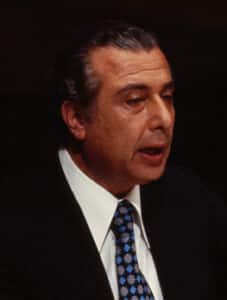
Spyros Kyprianou was the youngest president
Although there were three men standing, the result was a foregone conclusion as it had been in all the presidential elections that preceded them. In fact in the 1970s people did not even have to vote as in the two scheduled elections (1973 and 1978) there was only one candidate.
There had also been a supplementary election, in September 1977, a month after the death of President Makarios, for a five-month term until the next scheduled elections. There was no vote as Kyprianou, then serving as president of the House, was the only candidate.
Essentially, presidential elections were a non-event until 1988. Until then, you could bet your house on the favourite winning, even when there was more than one candidate.
The first election was held on December 13, 1959, soon after the establishment of the Cyprus Republic, with Archbishop Makarios, the popular leader of the Eoka struggle, standing against Ioannis Clerides who was backed by the communist party Akel and a minority that did not want a church leader as president. Clerides took an impressive 33.18 per cent of the vote.
It was the first and last time there was such a significant challenge to Makarios’ authority. By the time of the next election on February 25, 1968 (the president’s term had been extended until the end of 1967 by special law because of the troubles), Akel on orders from the Soviet Union had also joined the pro-Makarios camp and nobody could stand in the archbishop’s way.
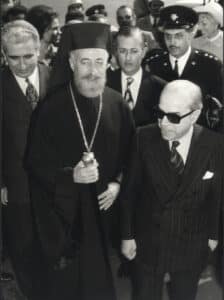
President Makarios
Thus he was the candidate of the Left and the Right, but psychiatrist Takis Evdokas, a nationalist who wanted to continue the struggle for Enosis, stood against him, arguing there was a need for pluralism and normal political life. Neither thrived at the time and Evdokas experienced it first hand at his main election gathering during which pro-Makarios thugs pelted him with tomatoes eggs and yoghurts. Policemen were also said to have taken part.
The archbishop swept home with 96.26 per cent of the vote in 1968, but Evdokas did not give up his fight for pluralism. In 1970 he was imprisoned briefly for a critical article of Makarios. After the treatment Evdokas received, nobody dared stand against Makarios in 1973 and he was elected for a third term, unopposed.
There was no need to vote in 1978 either, following the bizarre kidnapping of candidate Spyros Kyprianou’s eldest son Achilleas, who was serving at the time as an officer in the commandos. Glafcos Clerides, who had intended being a candidate, used the kidnapping as a reason not to stand. It was a calculated move, as Kyprianou, backed by Diko, Akel and Edek, would have won comfortably.
The first presidential elections that were a real contest were held in 1988, with the four main parties each having a candidate. Diko-supported Kyprianou was seeking a third term, but he could no longer rely on the backing of Akel which decided to back successful businessman George Vassiliou, who came from a communist family. The other candidates were Lyssarides and Clerides, plus an unknown, Thrasos Georgiades who took 187 votes.
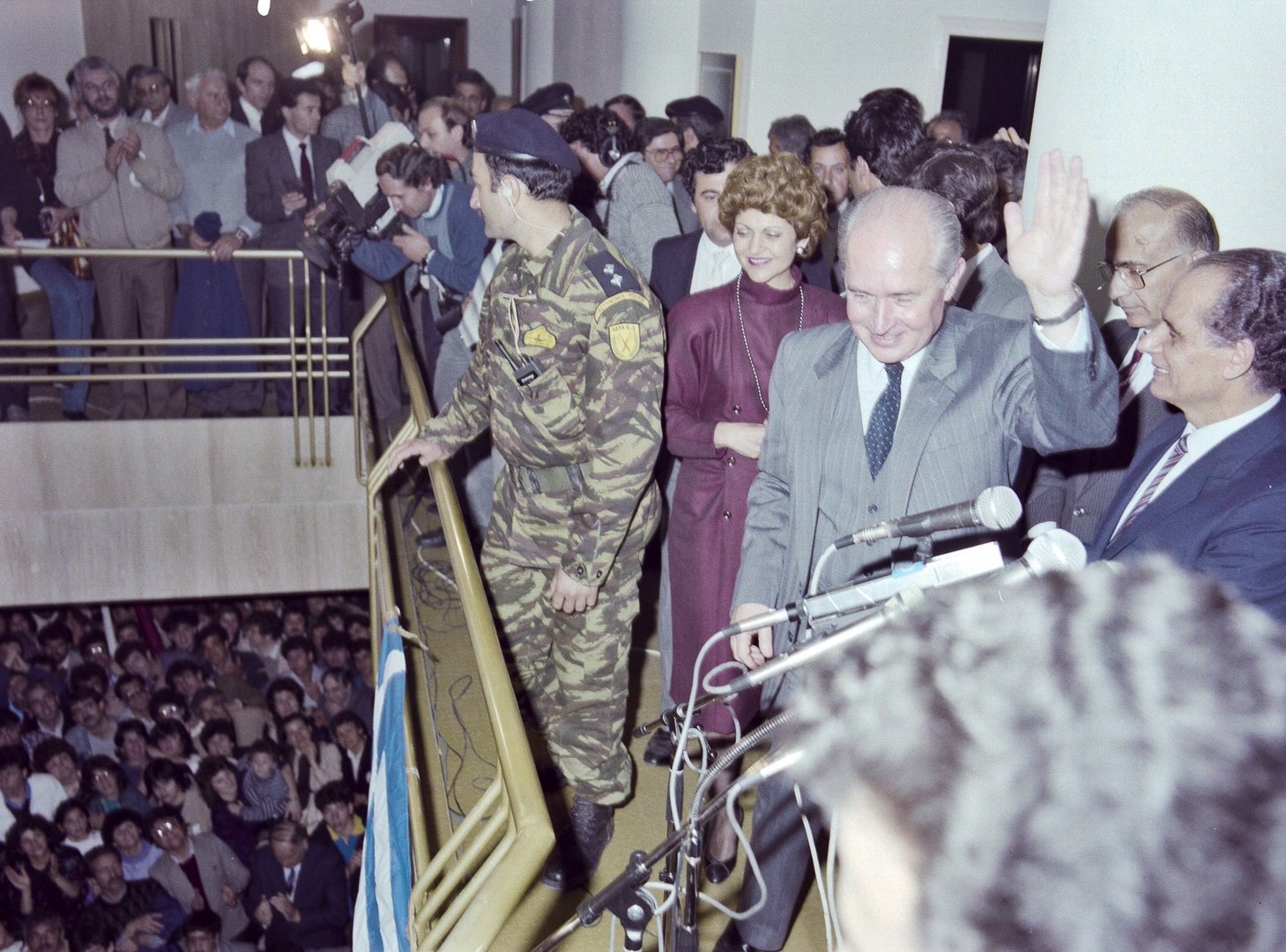
George Vassiliou celebrating victory in 1988
There was no outright winner – Clerides came first with 33.3 per cent of the vote – so for the first time in presidential election history there was a second Sunday run-off between the top two candidates a week later. Vassiliou won the showdown.
The contest was repeated five years later, but with the opposite outcome. Valentine’s Day, 1993, proved third time lucky for Clerides who, aged 73, defeated Vassiliou in the run-off election by a meagre 2,000 votes and became the oldest man to be elected president. It was arguably the most dramatic of all elections as Vassiliou had taken an astonishing 44.15 per cent of the vote on the first Sunday and seemed a shoo-in for a second term.
But in the week leading up to the run-off, Clerides had struck a deal with Kyprianou, offering Diko several ministries in a ‘co-government’ and edged Vassiliou out. After years of trying Disy, which had been established in 1976, was finally in power, but the Diko-Disy government that emerged was rather dysfunctional. Before the end of its term, Kyprianou turned against Clerides, claiming the latter had not honoured a gentleman’s agreement – made to secure Diko’s electoral support – by which the Diko boss would be the presidential candidate of the two parties in 1998.
This led Kyprianou into an alliance with Akel, backing the candidacy of former foreign minister George Iacovou. Five experienced politicians also stood as candidates, including Nicos Rolandis, Nicos Koutsou, Lyssarides, Alexis Galanos and George Vassiliou, but they could not challenge the two leading candidates. Clerides won the run-off against Iacovou securing a second term, aged 78.
The 2003 elections were of vital importance for the Cyprus problem as the UN since 2002 had undertaken its biggest drive for a settlement, with the active support of the international community. A couple of versions of the Annan plan were drafted by the time of the elections, and although opposition to it had been building, it was believed the time had come for a settlement.
Clerides announced he would stand again, aged 83, to ensure settlement efforts succeeded and would step down after 18 months. This angered the then attorney-general and chief negotiator, Alecos Markides, who had been promised by Clerides he would be the Disy candidate in 2003. Markides stood anyway, splitting the Disy vote.
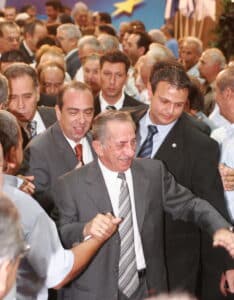
Tassos Papadopoulos was the victor in 2003 and led Greek Cypriot rejection of the Annan plan the following year
The main challenger was Diko leader Tassos Papadopoulos, a dyed-in-the wool rejectionist, who had managed to secure the backing of Edek and Akel. Akel agreed to back him after Papadopoulos made a pledge that he would work for a settlement based on the Annan Plan, a pledge he failed to honour a year later, when he campaigned stridently for a rejection of the plan, and persuaded 76 per cent of the population to vote ‘no’ in the referendum.
For the first time since 1983, the election in 2003 was decided on the first Sunday, Papadopoulos taking 51.51 per cent of the vote. Several reasons contributed to this – people had enough after 10 years of Clerides, the split in the Disy vote and voters may have believed Papadopoulos was more suitable for handling the settlement negotiations. By 2004 he had reverted to type and ensured the most comprehensive attempt to find a settlement was emphatically defeated by the Greek Cypriots.
By the time the next election arrived, the popularity Papadopoulos had gained from his referendum stance had waned and Akel left the government alliance, having decided for the first time in its history to contest the elections with an Akel leader as candidate – Demetris Christofias. Disy’s candidate was the former foreign minister Ioannis Kasoulides in what turned out to be a very close three-horse.
Papadopoulos, who was coping with a serious illness and died by the end of 2008, fought an underwhelming campaign and despite his referendum glory did not make the second round. He did have a big influence on the outcome, however, by giving Diko’s support to Christofias in the run-off, which ensured a comfortable victory.
Christofias was the first ever Akel chief to be elected president, but this turned out to cause more harm than good to the party. The Mari explosion, excessive state spending, a struggling banking sector, which led to the government’s exclusion from the markets and a refusal to agree an assistance programme led to an economic meltdown by the end of his term.
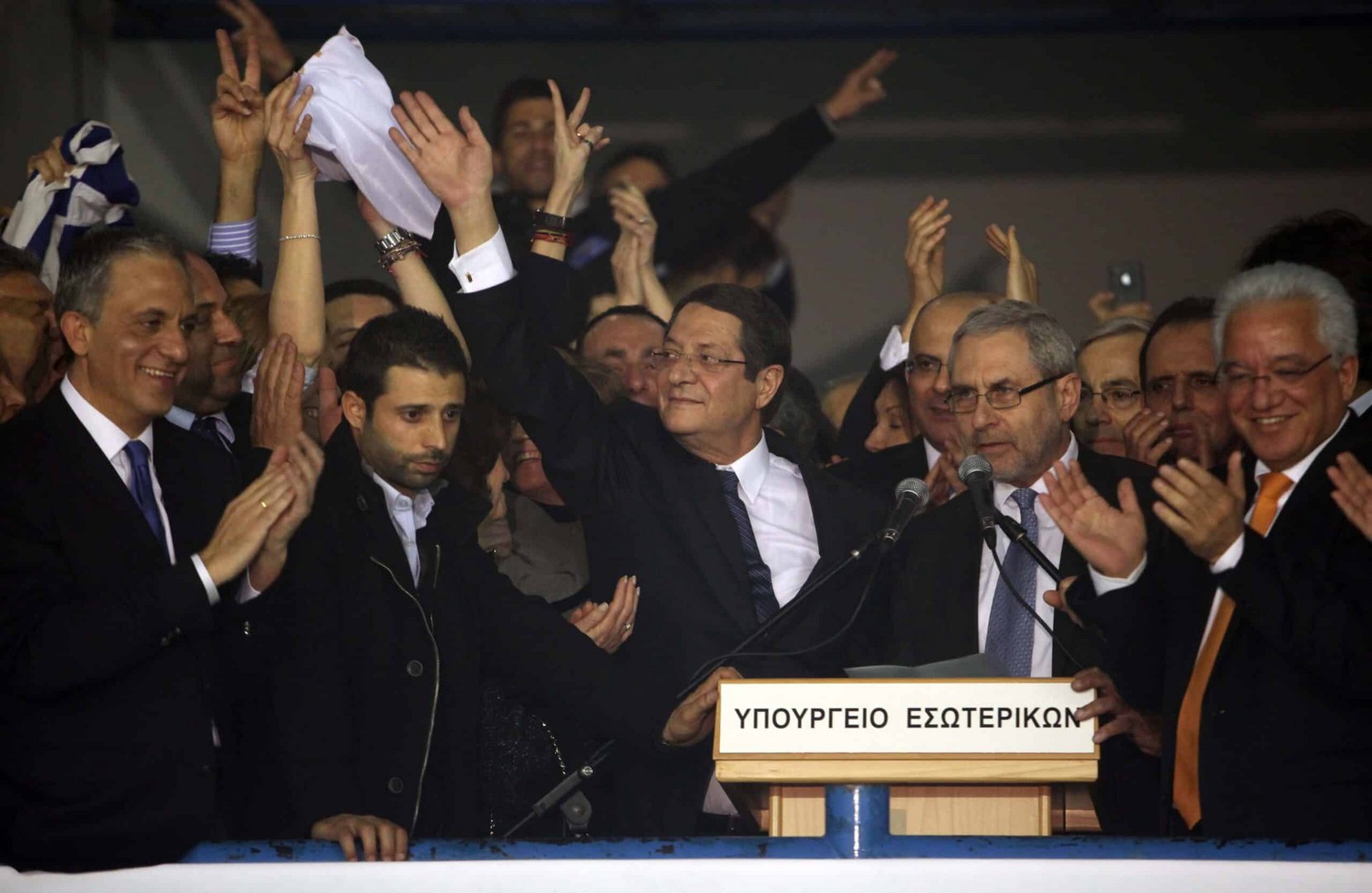
Nicos Anastasiades winning a first term in 2013
He would have been humiliated if he sought re-election in 2013 after his disastrous managing of the economy, so Akel made an obscure scientist, Stavros Malas its candidate. The time had come for Disy’s Nicos Anastasiades, who, despite not being popular beyond the boundaries of his party, was seen as the best candidate to cope with economic meltdown. He had also entered into an alliance with Diko. He took 45.46 per cent of the vote in the first Sunday and easily won the run-off against Malas.
The same script was followed in 2018, although Diko’s leader Nicolas Papadopoulos also stood but failed to make the run-off. Anastasiades comfortably defeated Malas, thus ensuring a second term.
Election facts
The Cyprus Republic since the first elections in 1959 has had seven different presidents. Archbishop Makarios was the longest serving in office for 17 years having secured three terms
There have been 13 presidential elections and a supplementary election after the death of Makarios in 1977, the term lasting five months.
Makarios and Kyprianou were the only ones to become president without elections as there was no challenger in 1973 and 1978 respectively.
The election of 1983 was the first with more than two candidates. 1988 was the first time there was a run-off election. There has been one ever since with the exception of 2003 when Papadopoulos took more than 50 per cent of the vote on the first Sunday.
Two leaders of Diko, two of Disy and one of Akel became president. Makarios and Vassiliou were the only non-party presidents.
Clerides was the oldest man to be elected president – he was first-elected at 73 and re-elected at 78, leaving office at 83.
Kyprianou was the youngest ever president, aged 45 when he was first elected.
Vassiliou, Papadopoulos, and Christofias were one-term presidents.

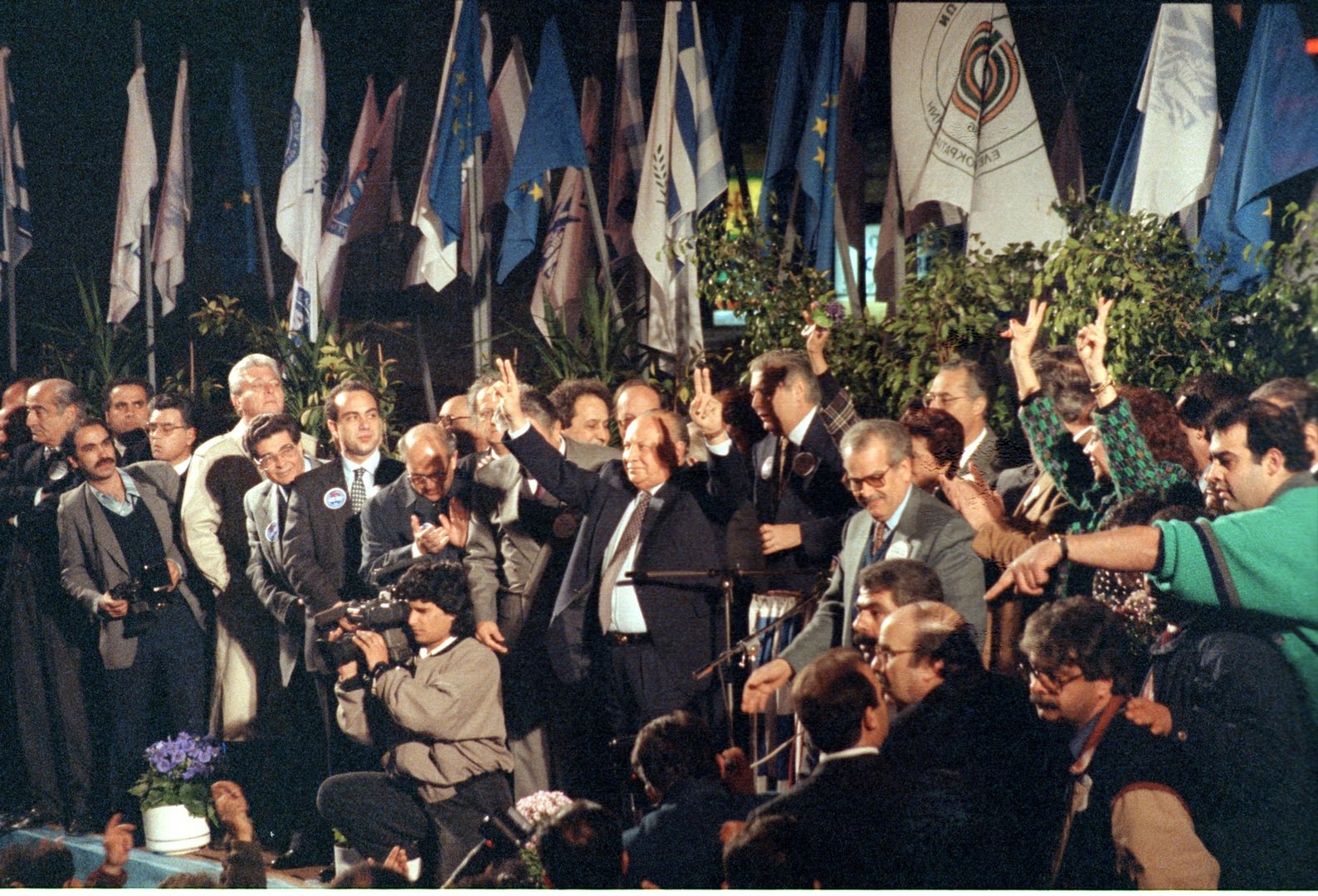





Click here to change your cookie preferences